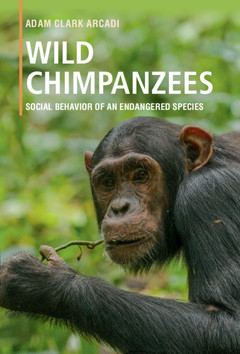Description
Wild Chimpanzees
Social Behavior of an Endangered Species
An introduction to chimpanzee behavior and conservation, synthesizing findings from long-term field studies in the African rainforest belt.
Language: English
Wild Chimpanzees
Publication date: 06-2018
244 p. · 15.3x22.8 cm · Paperback
Publication date: 06-2018
244 p. · 15.3x22.8 cm · Paperback
Wild Chimpanzees
Publication date: 06-2018
244 p. · 15.7x23.5 cm · Hardback
Publication date: 06-2018
244 p. · 15.7x23.5 cm · Hardback
Description
/li>Contents
/li>Biography
/li>
As our closest primate relatives, chimpanzees offer tantalizing clues about the behavior of early human ancestors. This book provides a rich and detailed portrait of chimpanzee social life in the wild, synthesizing hundreds of thousands of hours of research at seven long-term field sites. Why are the social lives of males and females so different? Why do groups of males sometimes seek out and kill neighboring individuals? Do chimpanzees cooperate when they hunt monkeys? Is their vocal behaviour like human speech? Are there different chimpanzee 'cultures'? Addressing these questions and more, Adam Arcadi presents a fascinating introduction to the chimpanzee social universe and the challenges we face in trying to save this species from extinction. With extensive notes organized by field site and an appendix describing field methods, this book is indispensable for students, researchers, and anyone else interested in the remarkable and complex world of these intelligent apes.
Preface; 1. Primates, apes, and the study of chimpanzee social behavior; 2. Seven long-term field studies; 3. Chimpanzee fission-fusion social organization and its conservation implications; 4. Sex differences in ranging and association patterns; 5. Female social relationships and the defining influence of offspring care; 6. Male social relationships and the dynamic interplay of competition and cooperation; 7. Sexual behavior: conflicting strategies of males and females; 8. Coalitionary lethal aggression between and within communities; 9. Hunting, eating, and sharing meat; 10. Communication: the form and content of signals; 11. Community differences in grooming postures and tool use: innovation, social learning, and the question of 'culture'; Epilogue; Appendix: field methods for studying wild chimpanzees.
Adam Clark Arcadi is an Associate Professor in the Department of Anthropology at Cornell University, New York, where he teaches courses in human evolution, primate behavior and primate conservation. He has conducted field research on wild chimpanzees in Kibale National Park (Uganda), and collaborated with researchers at the Gombe Steam Research Center (Tanzania) and the Taï Chimpanzee Project (Ivory Coast).
© 2024 LAVOISIER S.A.S.




